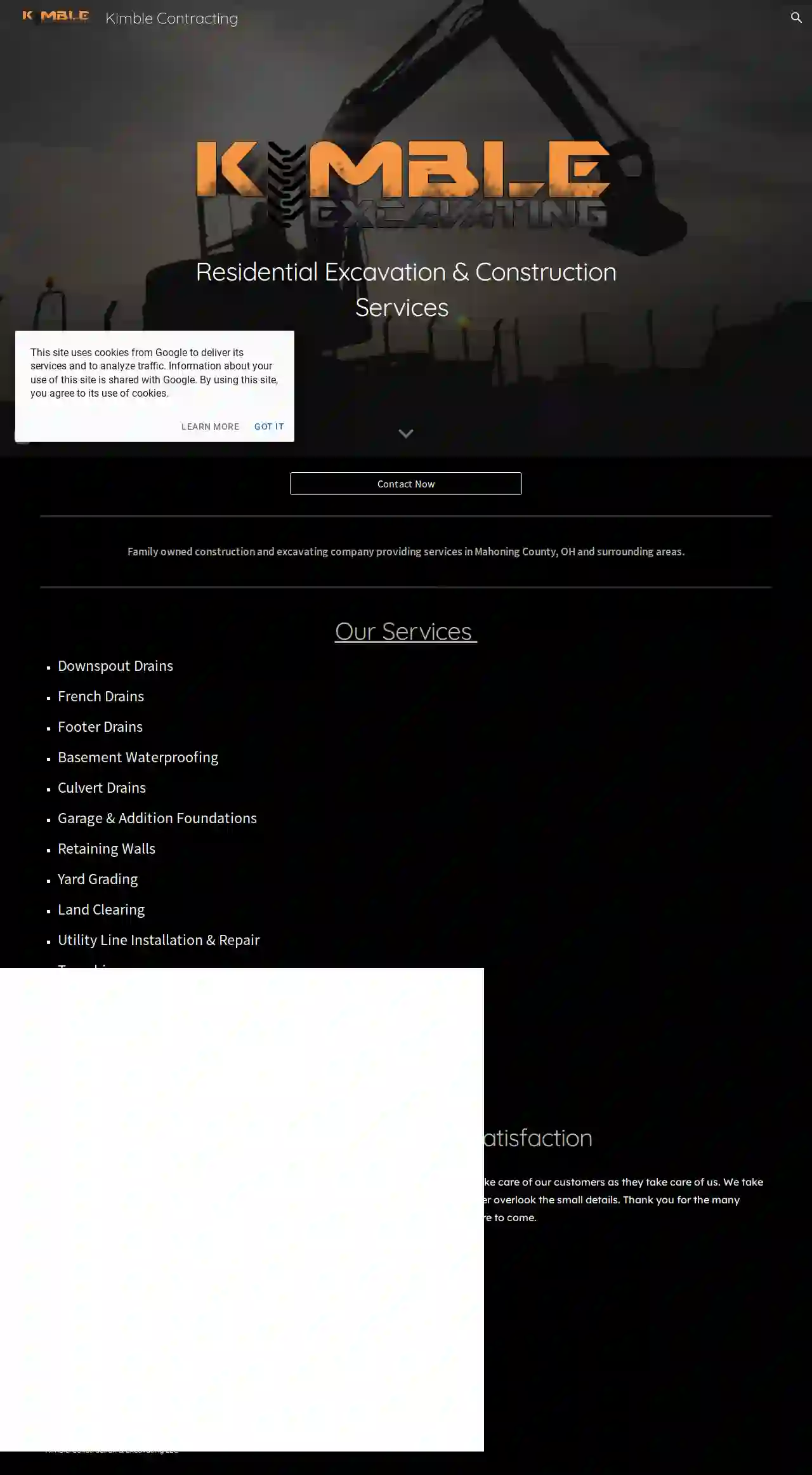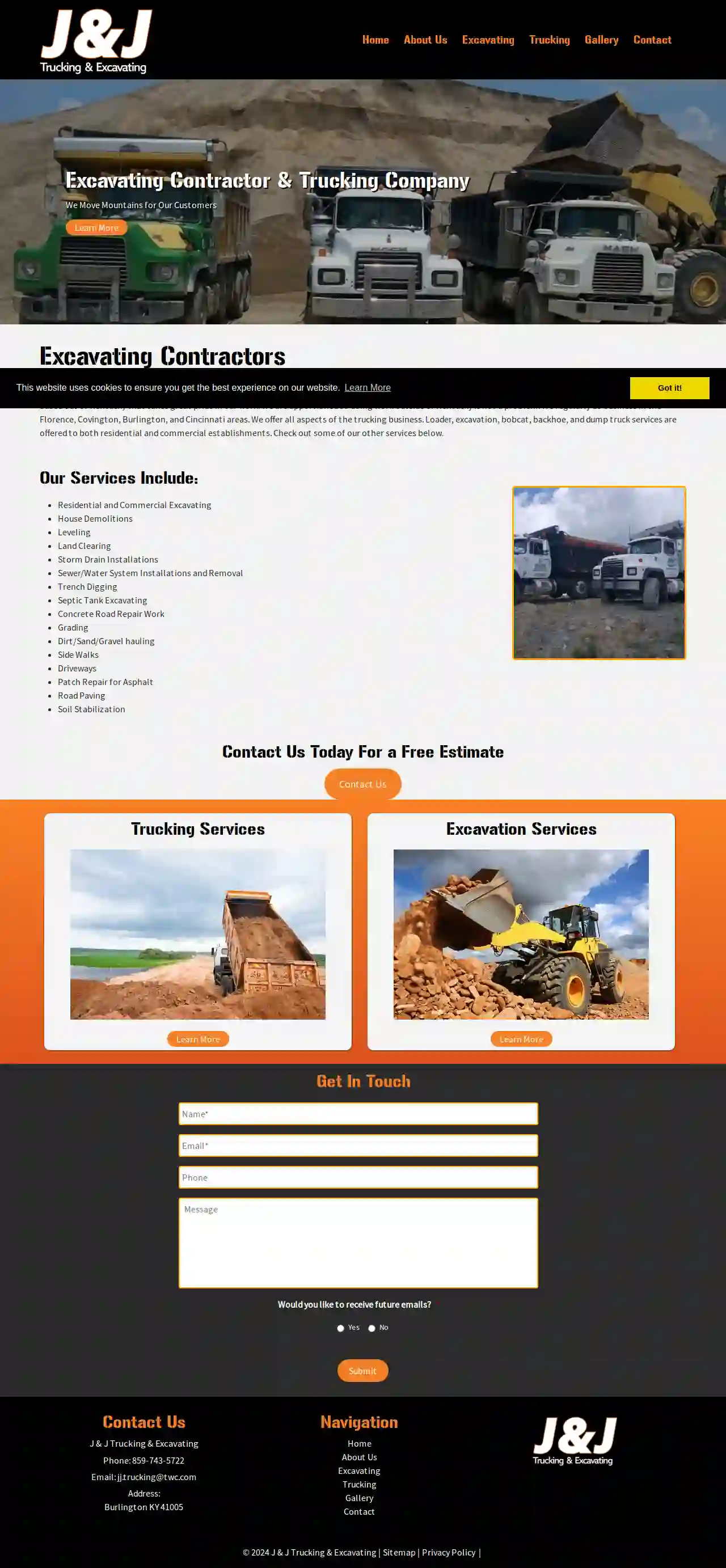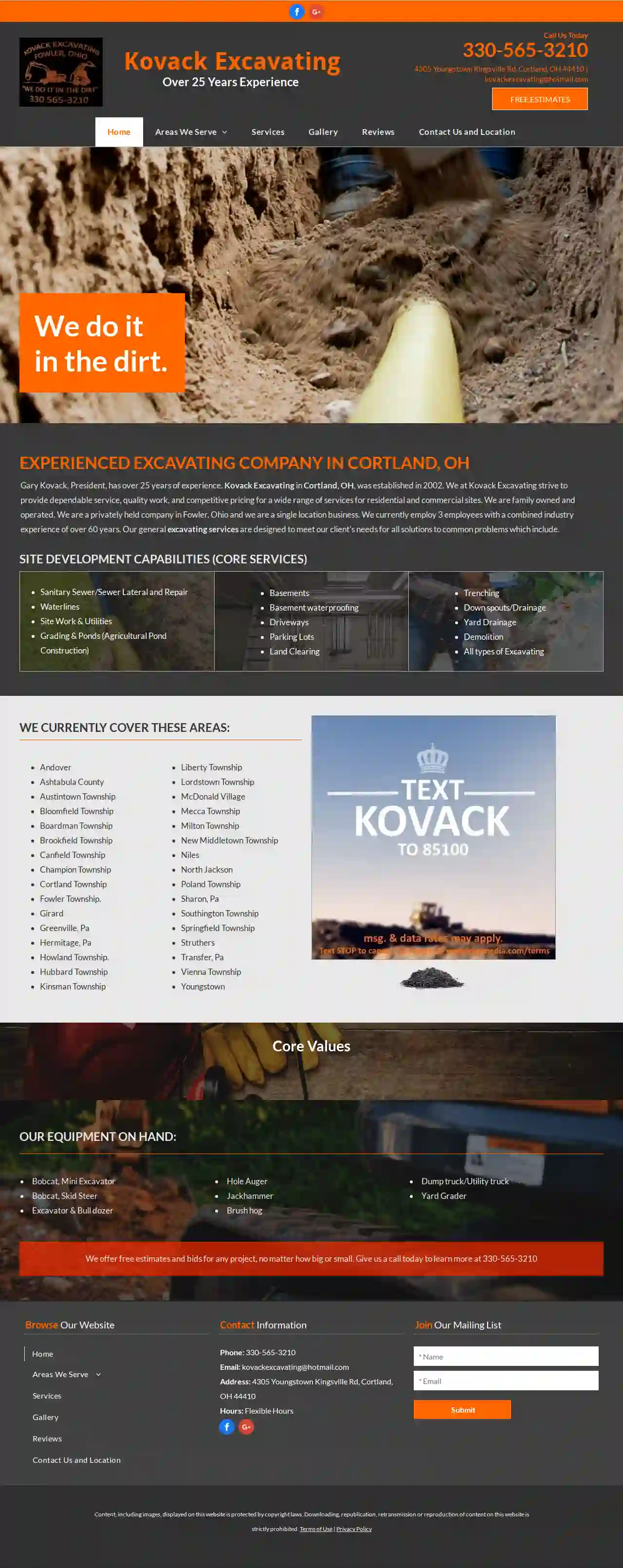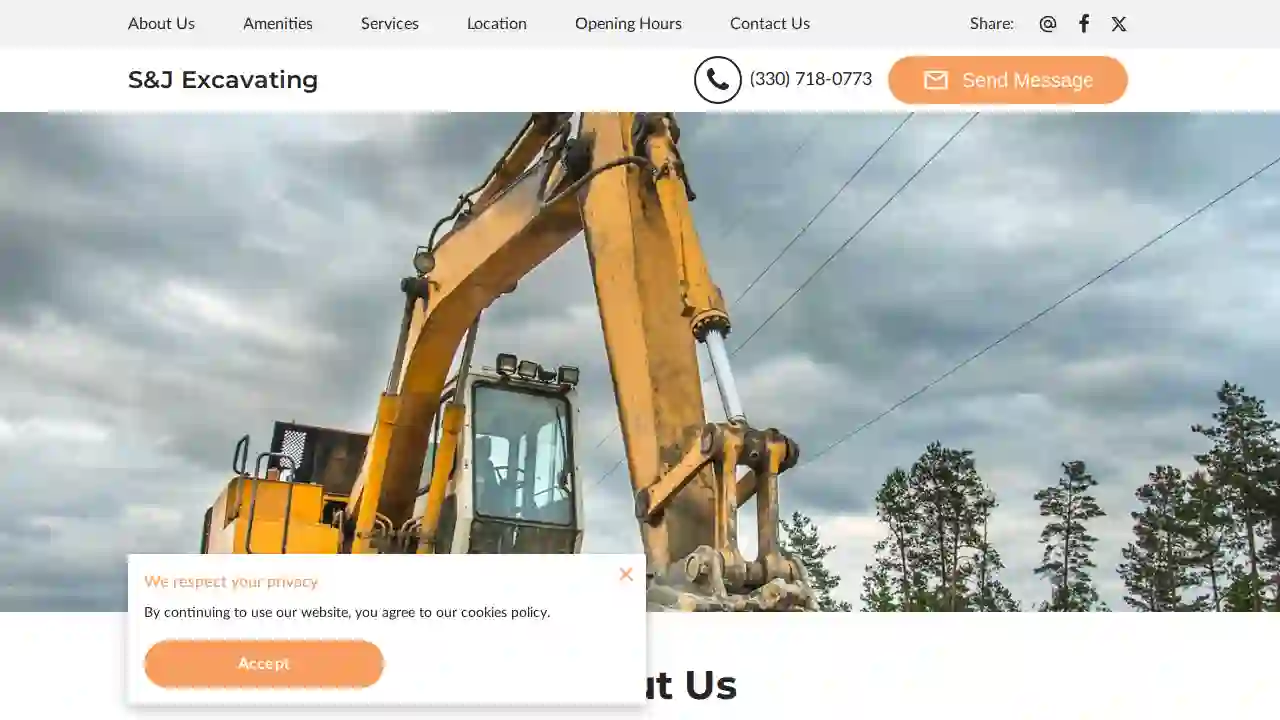Excavation Contractors Oregon
Find the best Land Excavation in Oregon
Receive 3 FREE Digging Contractors quotes for your project today! Compare profiles, reviews, accreditations, portfolio, etc... and choose the best service.

Kimble Construction & Excavating
53 reviewsYoungstown, USKimble Contracting: Your Trusted Partner for Residential Excavation and Construction Kimble Contracting is a family-owned construction and excavating company serving Mahoning County, OH, and surrounding areas. We are dedicated to providing high-quality services with a focus on customer satisfaction. Our team takes pride in our work and pays meticulous attention to detail, ensuring your project is completed to the highest standards. We understand the importance of building strong relationships with our clients. As a small business, we treat our customers like family, providing personalized attention and exceptional service. We are committed to exceeding your expectations and delivering projects on time and within budget. Thank you for considering Kimble Contracting for your next project. We look forward to working with you!
- Services
- Why Us?
- Our Team
- Gallery
Get Quote
J&J Trucking & Excavation
3.73 reviewsBurlington, 41005, USWe Move Mountains for Our Customers J & J Trucking and Excavating has been offering commercial and residential trucking and excavation services for over 30 years. We are a small family-owned company based out of Kentucky that takes great pride in our work. We are apportioned so doing work outside of Kentucky is not a problem. We regularly do business in the Florence, Covington, Burlington, and Cincinnati areas. We offer all aspects of the trucking business. Loader, excavation, bobcat, backhoe, and dump truck services are offered to both residential and commercial establishments. With over 30 years in the trucking and excavating business you can trust on J & J trucking to get the job done right the first time. We are a small family-owned company based out of Kentucky that takes great pride in our work. We treat our customers the way we want to be treated and strive to make sure your project goes off without a hitch.
- Services
- Why Us?
- Gallery
Get Quote
Integra Excavating LLC
4.823 reviews2530 Hubbard Rd, Youngstown, 44505, USIntegra Excavating: Building a Foundation for Success Integra Excavating is a general contracting and excavating business dedicated to delivering high-quality projects of all sizes, on time and within budget. We are committed to exceeding industry standards and building lasting relationships with our clients. Since 2008, we have built a reputation for integrity, quality construction, and exceptional performance. Our team is fully bonded and insured, and we prioritize safety in all our operations. We are proud to serve Northeast Ohio and Western Pennsylvania with a wide range of services, including: General Excavating General Contracting Site Preparation & Demolition Trucking & Hauling Pre-Engineered Metal Buildings Aggregate Sales We believe in open communication and collaboration with our clients, subcontractors, government agencies, and local companies to ensure the most cost-effective and professional experience possible. Our commitment to our employees, community, and shared vision drives our success. Ready to discuss your next project? Contact us today!
- Services
- Why Us?
- Gallery
Get Quote
Kovack Excavating
52 reviews4305 Youngstown Kingsville Rd, Cortland, 44410, USKovack Excavating: Your Trusted Partner for Excavation Services in Cortland, OH Kovack Excavating is a family-owned and operated business with over 25 years of experience serving the Cortland, OH area. Led by Gary Kovack, our team is dedicated to providing dependable service, quality work, and competitive pricing for a wide range of residential and commercial excavation projects. We understand the importance of exceeding client expectations and strive to deliver solutions that meet your specific needs. We are proud to be a privately held company in Fowler, Ohio, and we are committed to serving our local community. Our team of experienced professionals brings over 60 years of combined industry experience to every project. We are fully licensed, bonded, and insured, ensuring peace of mind for our clients. At Kovack Excavating, we believe in building strong relationships with our clients. We offer free estimates and on-site evaluations before every job, ensuring transparency and clear communication throughout the process. We are committed to safety, integrity, and exceeding client expectations. Our core values guide everything we do, ensuring a positive and reliable experience for every client. We are proud to serve the following areas: Andover, Ashtabula County, Austintown Township, Bloomfield Township, Boardman Township, Brookfield Township, Canfield Township, Champion Township, Cortland Township, Fowler Township, Girard, Greenville, PA, Hermitage, PA, Howland Township, Hubbard Township, Kinsman Township, Liberty Township, Lordstown Township, McDonald Village, Mecca Township, Milton Township, New Middletown Township, Niles, North Jackson, Poland Township, Sharon, PA, Southington Township, Springfield Township, Struthers, Transfer, PA, Vienna Township, and Youngstown.
- Services
- Why Us?
- Our Team
- Gallery
Get Quote
S2K Excavating
32 reviewsDayton, USAbout Us S2K Excavating has been serving Dayton, Ohio and the surrounding areas since 2001. We offer a variety of commercial and residential, bonded and insured services however our strengths lie in our quality team and dedication to our clients.
- Services
- Why Us?
- Our Team
- Testimonials
- Gallery
Get Quote
Steadfast Excavating
58 reviews61 Alverne Drive, Poland, 44514, USAbout Steadfast Excavating Steadfast Excavating LLC is an excavation company located in Northeast Ohio that services the surrounding area. Our company’s values start with quality and reliability. Our services include earthmoving, excavating, land clearing, leveling and grading, water and sewer lines, trench digging, pond work, so much more.
- Services
- Why Us?
- Our Team
- Gallery
Get Quote
Newton's Outdoor Services
55 reviews778 W Richard Dr, Xenia, 45385, USYour friend with a tractor Your choice for landscaping and excavation in Xenia, Ohio and surrounding areas! We're here to do what you need, when you need it. Contact us today to find out how we can help you get the results you want. Get to know us! Newton's Outdoor Services is owned and run by Brandon Newton of Xenia, Ohio with support from his wife Jessica and son Clayton. Passion for operating equipment came at a young age where he learned to drive tractors and work around the farm. A graduate of Bethel High School. In high school he attended the Miami Valley Career Technology Center where he completed the Ag Resources Management program. While also participating in FFA and 4-H and showing livestock at the local fair. Since then he has worked at Copey's Butcher Shop as a Butcher for 9 years before deciding to start his business in the Landscaping and Excavation industry. In his free time Brandon enjoys being in the great outdoors hunting, fishing, and spending time with family. He loves to meet new customers and provide friendly and quality services. Be sure to reach out if there is anything we can help you with!
- Services
- Why Us?
- Gallery
Get Quote- Em
Empire Excavation
53 reviewsCincinnati, USAbout Empire Excavation LLC Empire Excavation LLC is a locally owned and operated excavation company serving the [CITY] area. We are committed to providing our clients with high-quality excavation services at competitive prices. Our team of experienced professionals is dedicated to delivering exceptional results on every project, no matter how big or small. We specialize in a wide range of excavation services, including: Site preparation Foundation excavation Utility installation Demolition Grading And more! We are fully licensed and insured, and we are committed to safety on every job site. We use only the latest equipment and technology to ensure that our projects are completed on time and within budget. Contact us today for a free estimate!
- Services
- Why Us?
- Gallery
Get Quote 
Solid Rock Excavating, LLC
51 reviews[CITY], USAbout Solid Rock Excavating Solid Rock Excavating is a family-owned and operated business with a commitment to quality work and quality character. We are dedicated to providing our clients with the highest level of service and expertise. We have a team of experienced professionals who are committed to getting the job done right, on time, and within budget. We are proud to serve the [CITY] community and surrounding areas. We offer a wide range of services, including: Excavation Grading Site preparation Demolition Concrete work And more! We are committed to providing our clients with the best possible experience. We are always available to answer your questions and address your concerns. We are also committed to safety and environmental responsibility. We are proud to be a part of the [CITY] community and look forward to serving you.
- Services
- Why Us?
- Testimonials
- Gallery
Get Quote
S&J Excavating
Youngstown, Ohio, 44510, USAbout Us Here at S&J Excavating we deliver a selection of professional excavation services based in the area. Our experienced excavators do more than just dig holes and transport dirt, our services include a plethora of skills from preparing your building site for foundation laying, digging trenches, as well as creating drainage routes across building developments. Of course, we still also dig holes and transport dirt. So if you’re interested in our excavation services give us a message on the form below to find out more, or call us at +12348557653 .
- Services
- Why Us?
Get Quote
Over 22,076+ Excavation Pros onboarded
Our excavation contractors operate in Oregon and surroundings!
ExcavationHQ has curated and vetted the Best Excavation Contractors near Oregon. Find a top & trustworthy contractor today.
Frequently Asked Questions About Excavation Contractors
- Excavations Deeper Than a Certain Depth: This varies by jurisdiction, usually around 5 feet.
- Excavations Near Utilities: Digging near buried utilities (gas, water, electric) often requires permits and utility locates to prevent damage.
- Excavations Affecting Public Property: Projects impacting sidewalks, roads, or other public areas typically require permits.
- Excavations in Environmentally Sensitive Areas: Projects in wetlands, floodplains, or other sensitive areas might need special permits.
- New Construction: Laying foundations, basements, or underground utilities for new buildings.
- Home Additions: Creating space for new rooms, basements, or extensions.
- Landscaping: Leveling ground, creating slopes, installing retaining walls, or digging for ponds or pools.
- Drainage Improvement: Installing French drains, drainage ditches, or swales to manage water runoff.
- Utility Installation or Repair: Laying new water, sewer, gas, or electrical lines, or repairing existing ones.
- Demolition: Clearing debris and preparing the site after demolishing a structure.
- Determine the Area: Measure the length and width of the area you want to fill. Multiply them to get the area in square feet (or meters).
- Determine the Depth: Measure the difference between the existing grade and the desired grade (how much you need to raise the ground). This is the depth of fill required.
- Calculate Volume: Multiply the area (step 1) by the depth (step 2) to get the volume in cubic feet (or meters).
- Account for Compaction: Fill dirt compacts when it settles, so add 10% to 25% to the calculated volume to account for compaction. The exact percentage depends on the type of fill material.
What is the difference between cut and fill excavation?
Cut: Involves excavating soil from an area where the existing grade is higher than the desired grade.
Fill: Refers to using the excavated soil ('cut' material) to raise the grade in an area where the existing grade is lower than desired.
This method minimizes the need to import or export soil, reducing costs and environmental impact. It's commonly used for site preparation, road construction, and landscaping.
Do I need a permit for excavation?
How do I know if I need excavation for my project?
How do I calculate how much dirt I need for fill?
What is the difference between cut and fill excavation?
Cut: Involves excavating soil from an area where the existing grade is higher than the desired grade.
Fill: Refers to using the excavated soil ('cut' material) to raise the grade in an area where the existing grade is lower than desired.
This method minimizes the need to import or export soil, reducing costs and environmental impact. It's commonly used for site preparation, road construction, and landscaping.
Do I need a permit for excavation?
- Excavations Deeper Than a Certain Depth: This varies by jurisdiction, usually around 5 feet.
- Excavations Near Utilities: Digging near buried utilities (gas, water, electric) often requires permits and utility locates to prevent damage.
- Excavations Affecting Public Property: Projects impacting sidewalks, roads, or other public areas typically require permits.
- Excavations in Environmentally Sensitive Areas: Projects in wetlands, floodplains, or other sensitive areas might need special permits.
How do I know if I need excavation for my project?
- New Construction: Laying foundations, basements, or underground utilities for new buildings.
- Home Additions: Creating space for new rooms, basements, or extensions.
- Landscaping: Leveling ground, creating slopes, installing retaining walls, or digging for ponds or pools.
- Drainage Improvement: Installing French drains, drainage ditches, or swales to manage water runoff.
- Utility Installation or Repair: Laying new water, sewer, gas, or electrical lines, or repairing existing ones.
- Demolition: Clearing debris and preparing the site after demolishing a structure.
How do I calculate how much dirt I need for fill?
- Determine the Area: Measure the length and width of the area you want to fill. Multiply them to get the area in square feet (or meters).
- Determine the Depth: Measure the difference between the existing grade and the desired grade (how much you need to raise the ground). This is the depth of fill required.
- Calculate Volume: Multiply the area (step 1) by the depth (step 2) to get the volume in cubic feet (or meters).
- Account for Compaction: Fill dirt compacts when it settles, so add 10% to 25% to the calculated volume to account for compaction. The exact percentage depends on the type of fill material.